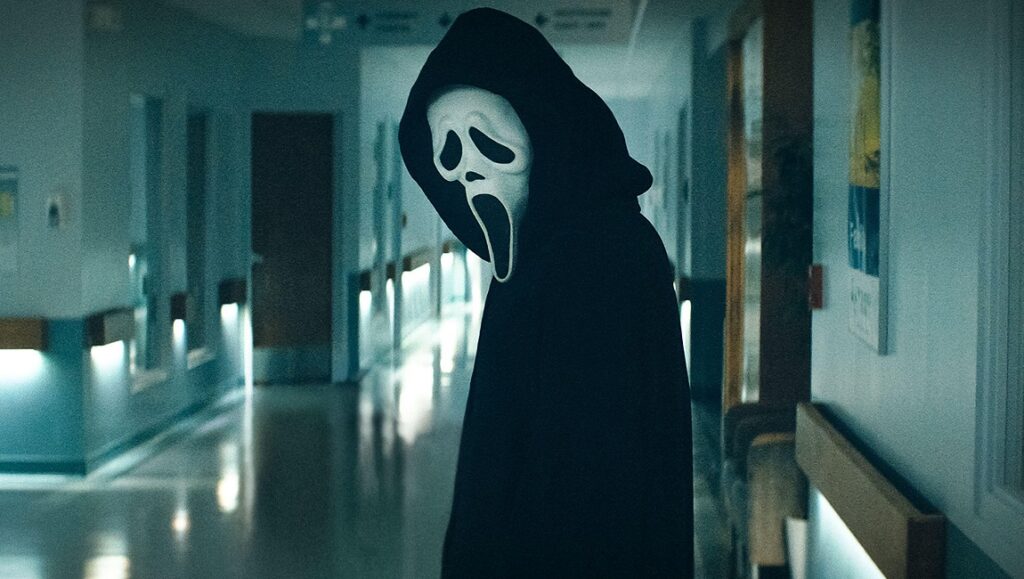2022’s Scream is a sincere betrayal of the franchise’s legacy and devoid of Craven’s masterful craft and play.
A rejoinder to a dead subgenre, Wes Craven’s 1996 film Scream unquestionably revitalized the slasher movie. It was a crisp, clever, funny, gleefully violent little prank, one that discussed its hoary trappings not just narratively but formally and thematically, sort of a film student savant’s thesis, diagnosing its subject while still supplying a sterling example of it. Pure have/eat cake revelry.
Of course, once anyone does anything right, we have to watch them repeat that success with a series of mistakes. Now we’re onto “Scream 5,” unceremoniously also just called Scream. We return to Woodsboro, California, scene of the original movie’s serial murders. In intervening decades, those crimes have been the increasingly watered-down inspiration for a series of slashers called Stab (in this movie universe we’re up to Stab 8), which in turn seem to be inspiring their own new killings. In the opening sequence of this new one, of course a recapitulation of the 1996 surprise cold open slaying of Drew Barrymore, a Ghostface-costumed murderer torments and attacks an unsuspecting young woman, Tara (Jenna Ortega). Soon, it becomes clear that there’s a new series of slashings afoot. All of them center on aspects or victims related to the original Woodsboro murders, and Tara’s big sister Sam (Melissa Barrera) seems to be at the center of it all. To make matters worse, Sam is haunted by the specter of OG Ghostface and Scream’s villain, Billy Loomis, for reasons that shouldn’t be disclosed. Maybe if we ask Sidney Prescott (Neve Campbell), the object of Billy’s ire, she might be able to solve a new mystery.
2022’s Scream is only marginally better than its most recent predecessor, 2011’s Scream 4, but at least that one was helmed by Craven, who directed every previous installment, and who had a flair for dramatic compositions, cheeky meta-humor, and superb casting. Even when those elements failed him, as they most certainly did in Screams 3 and 4, he never failed to turn in a sturdy bit of attempted metatext. But that was 10 years ago at its most recent, and 25 for the original Scream. In the meantime, the meta-horror virus has infected the entire genre; it’s nearly impossible to find a horror film, of any stripe, that isn’t in some way commenting on its own existence. Self-reflexivity has become the central aspect of the category, doomed exactly like crime thrillers were in the wake of Reservoir Dogs and Pulp Fiction. It’s an exhausted idea, worthless and trite. Scream 4 tried to introduce social media substantively into its metafiction, but instead only produced an insipid “How Do You Do Fellow Kids?” bit of forced quasi-satire. This fifth entry sets its sights on, of all things, toxic genre fandom and stagnant IP — surely these are things that matter to Reddit threads and Twitter hashtags, but the foundations of a genuinely frightening horror film they are not. Simply making mention of legacy sequelitis or junk science terms like “elevated horror” does not count for actual metatext; those are merely buzzwords.
Craven’s loss (he passed away in 2015) is also crucially felt. His long lenses and Humanities professor semiotics infused the franchise —even at its worst — with a playful energy, a genuinely sly sense of humor, and a real love of grisly violence that this new entry can’t hope to match. This Scream’s humor is entirely rooted in callbacks to the first film or else in crummy visual gags (like an extended sequence of fake-outs in an empty house) that are themselves recycled from the hundreds of empty slashers that Scream ’96 was taking to task. The joke is tired. As directed by Radio Silence, the duo of Matt Bettinelli-Olpin and Tyler Gillett, Craven’s long lenses and grainy blacks are replaced by reductive, timid compositions you could find in any indie horror example. Then there’s bringing back the legacy cast (Neve Campbell, Courtney Cox, and David Arquette) for completely perfunctory appearances, especially since these characters have literally no involvement in the new mystery — a mystery that’s easily solved by anyone paying attention in the first 15 minutes, by the way. In the end, there is not a single surprising element in Scream, and that’s a sincere betrayal of whatever legacy belongs to this franchise, which started so simply with an idea that nobody saw coming.


Comments are closed.